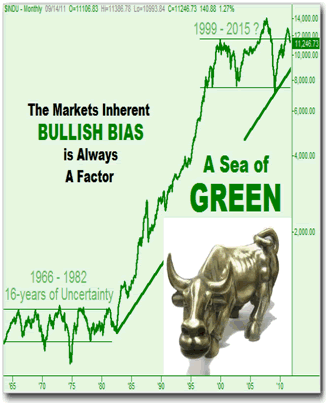Why Has the Stock Market Yet to Crash?
Stock-Markets / Stock Markets 2011 Sep 16, 2011 - 01:36 AM GMTBy: Joseph_Russo
An Old Type of Business-As-Usual
One could easily misperceive the 17-years of “entitlement” rally from 1982 through 1999 as normal and representative of the type of “certainty” necessary to carry out business as usual.
In my view, striving toward returning to another cycle of excess to compensate us for enduring more than a decade of uncertainty is akin to a junkie going on a bender simply because he has endured the pain of sobriety for a few weeks.
How soon we forget. Prior to the launch of our aptly coined 17-year entitlement rally, we experienced 16 turbulent years of incredible uncertainty from 1966 through 1982.
History clearly documents that our last period of prolonged uncertainty contained a host of very similar if not far more pronounced levels of existential questions surrounding the durability of our economic future.
Before one concludes that the Dow is destined for a total collapse, one should never rely upon the simple fact that stocks go up and down without factoring in an underlying fundamental truth, which is that stocks possess an inherent bullish bias. That is why markets have yet to crash.
Witness 1966-1982. It is simple to understand that after a prolonged bout of uncertainty that durable solutions (flawed as most of them were) will inevitably surface to unshackle the gridlock.
Witness 1982-1999. It is also simple to understand that after a prolonged period of too much “certainty” that complacency, imprudence, and greed begin to permeate and destroy the economic landscape.
This ignorant but quite human process is the very essence of the quintessential boom and bust cycle.
No matter how much sense it may make to learn from history rather than react to the present, as a collective, we cannot seem to grasp this simple essential wisdom. Although challenge and adversity is unavoidable, the way in which we cope with such episodes is a conscious choice of our collective leaders alongside those with the highest of influential powers.
 The growing number of well respected voices who place direct blame on the fed, corrupt politics and the lobby power of transnational mega-corporations for the insanity and pain caused by these repetitive cycles are likely correct to a large extent.
The growing number of well respected voices who place direct blame on the fed, corrupt politics and the lobby power of transnational mega-corporations for the insanity and pain caused by these repetitive cycles are likely correct to a large extent.
Until we acquire the collective and political resolve to mandate an impartial foundation of, logic, reason, and historical wisdom to legislate stable and sustainable policies, it is likely that our economic DNA shall remain poisoned with the flawed boom and bust disease.
Successfully investing and trading in such environments can be extremely frustrating. To navigate effectively, one must re-adjust expectations accordingly; develop the tenacity, and the will to prevail.
Delivering Alpha
On Wednesday, as advertised, US treasury secretary Tim Geithner and the CNBC cast of guests delivered some much-welcomed alpha with decent follow through on Thursday for good measure.
In short, alpha is a technical risk ratio used in modern portfolio theory. Simply stated, alpha represents what a portfolio manager or investment strategy adds to or subtracts-from returns relative to that of a benchmark index such as the S&P 500.
In a future article, I will share with readers how my investment and trading strategies measure up in terms of alpha. Stay tuned.
Until then,
Trade Better/Invest Smarter
By Joseph Russo
Chief Publisher and Technical Analyst
Elliott Wave Technology
Email Author
Copyright © 2011 Elliott Wave Technology. All Rights Reserved.
Joseph Russo, presently the Publisher and Chief Market analyst for Elliott Wave Technology, has been studying Elliott Wave Theory, and the Technical Analysis of Financial Markets since 1991 and currently maintains active member status in the "Market Technicians Association." Joe continues to expand his body of knowledge through the MTA's accredited CMT program.
Joseph Russo Archive |
© 2005-2022 http://www.MarketOracle.co.uk - The Market Oracle is a FREE Daily Financial Markets Analysis & Forecasting online publication.



